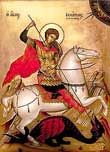St.George Russian Orthodox Church
THE NATIVITY FAST ( November 28 – January 6 2021)
The Nativity Fast is one of the four Canonical Fasting Seasons in the Church year. This is a joyous fast in anticipation of the Nativity of Christ.
The Nativity fast begins on November 15/28, and lasts forty days. The Nativity fast is not as strict as Great Lent or the Dormition fast, and can be compared to the Apostle’s fast. It was instituted by the Church so that we would worthily greet the feast of the Nativity of Christ after having cleansed our hearts by prayer and repentance.
The establishment of the Nativity fast, like many other long fasts, dates back to the early days of Christianity. Already in the fourth century, St. Ambrose of Milan, Philastrius, and Blessed Augustine recall the Nativity fast in their works. St. Leo the Great wrote about the antiquity of the Nativity fast in the fifth century.
At first the Nativity fast lasted seven days for some Christians and a little longer for others. At the council of 1166 held during the time of Patriarch Luke of Constantinople and the Byzantine Emperor Manuel, all Christians were instructed to keep the fast for forty days before the great feast of the Nativity of Christ.
Just as the Jews wandered in the wilderness for forty years before entering the Promised Land, the Holy Church leads us for forty days into the wilderness of the Fast before entering into God’s promise revealed on the Nativity. For the Jews, it was in order to shake off the bonds of slavery—physical, mental, and spiritual. An entire generation of people born and raised in Egyptian slavery was to die before those who no longer remembered being slaves and those who were born free were allowed to enter the “land flowing with milk and honey” (Exod. 3:8). And so it is with us: we must shake off the bonds of slavery to sins and passions—physical, mental, and spiritual. We must cease being slaves of sin and become friends of Christ by keeping His commandments (John 15:14).
Regarding the Nativity Lent: During this time, the general rule is that from Nov. 28//Nov. 15 and up until the Feast of Nativity, no meat, meat products, dairy, dairy products, or egg and egg-products are eaten. Children under 7, lactating and pregnant women are exempt. For those very ill or very aged, the fast can be lessened. If you have any questions or concerns please ask Fr. Alexandre and Fr. Lubomir.
Fish and fish products, wine and oil are allowed on weekends and certain weekdays. Shellfish (shrimp, scallops, lobster, crab, oysters, mussels, squid, clams, abalone, etc.) is always allowed.
The last five days of the Lent (Jan 2-6, n.s) gets stricter – no fish allowed, even on a weekend. The day before Nativity, the Eve of the Feast (Jan. 6) – there is a custom to eat nothing until the First Star appears in the early evening. (At least give it a try).
Beginning with the day of the Feast of Nativity, an 11-day fast-free period follows up until the Eve of Theophany, (Jan. 18,/Jan. 5), which is a strict fast day. The Feast of Theophany, the Baptism of the Lord Jesus Christ. (Jan. 19/Jan. 6) is always a fast-free day no matter what day of the week it falls on.
